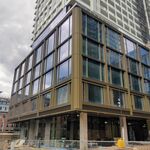Real Estate Alive and Well
Real Estate prices and the building industry could soon suffer in Canada, but I'm not so sure. Canadian banks and mortgage brokers didn't provide the same kind of subprime, no money down, interest-only mortgages accessible to people with bad credit that U.S. firms did (still do?). Also, the U.S. is further along in its housing cycle. Demand for homes out West in Canada is huge. In the GTA the condo boom continues, partly because of affordability versus single family homes, and partly because the province's Greenbelt and intensification legislation encourages this kind of building. As far as real estate as a whole goes, high immigration levels in Canada and Toronto in particular -- 100000 people are added to the GTA's population each year -- seem to ensure a steady trend of growth. If you want to see a market screaming for a correction, go to Britain, where housing prices are nearly double ours. Canada seems cheap by comparison.
Having said all this, an article in The Economist last year surmised that even if housing prices stayed flat instead of going down, a recession could result, because so many of us have our money tied up in our homes. Real Estate was a nice place to put money as an alternative to a bank, with interest on savings accounts and other interest rate-governed investments being so low. It's been great with year over year house price increases of 15 - 20 percent in some areas, at least for people who already own homes. It was also a viable alternative to investing in the stock market after the dot com crash. If real estate slows, what's left?
Now that real estate is slowing in the U.S. along with consumer spending, the last way the U.S. economy can be stimulated is through a lower U.S. dollar to boost exports. Governments can't afford further tax cuts and the consumer's credit card is maxed out.
It's tough to imagine the Canadian dollar weakening very much against the U.S. dollar with the U.S. Fed's current weak dollar policy in place, though a weaker Canadian dollar is a card Canada could play to avoid a recession. I hope it doesn't come to that, since a weaker currency encourages us to rely on being cheap instead of high value. To increase our productivity, and therefore our wages, we need to improve the quality and amount of what we produce through innovation rather than cheap labour. Sorry, I'm rambling...
It'll be interesting to see how the real estate market does in Canada over the coming months and what its impact will be on the larger economy.




